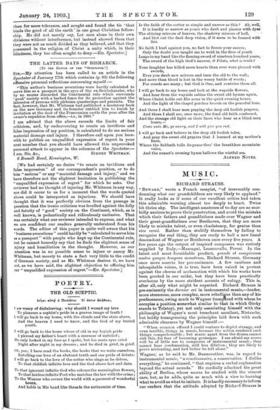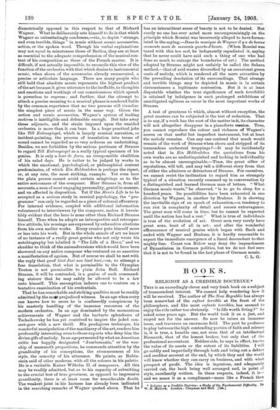MUS IC.
RICHARD STRAUSS.
" BEWARE," wrote a French essayist, "of irrevocably con- demning what our grandchildren are very likely to applaud." It really looks as if some of our excellent critics had taken this admirable warning almost too deeply to heart. Twice
bit 'thrice shy. The intelligent amateurs of to-day are so mor- bidly anxious to prove their penetration, and avoid the mistake which their fathers and grandfathers made over Wagner and their great-grandfathers over Beethoven, that they are more likely to mistake talent, or even charlatanry, for genius than vice versa. Rather than stultify themselves by failing to recognise the real thing, they are ready to hail a new lineal
descendant of Wagner or Beethoven once every five years. A few years ago the output of inspired, composers was entirely supplied by Italy,—Mascagni, Leoncavallo, Perosi. In the
latest and most formidable product, grande et conspicuum nostro guogue tempore monstrum, Richard Strauss, Germany ' once more asserts her pre-eminence. A few cautious and inhospitable voices, it is true, have been raised in protest against the chorus of acclamation with which his works have been greeted in our midst, but they have been practically overborne by the more strident accents of eulogy. This is,
after all, only what might be expected. Richard Strauss is pre-eminently the dernier cri in instrumental .music,—louder, more strenuous, more complex, more rebellious than any of his predecessors, owing much to Wagner (comAred with whom he occupies a position somewhat similar to that in which Gorky stands to Tolstoy), yet not only associating himself with the philosophy of Wagner's most trenchant assailant, Nietzsche,
but boldly transgressing the principles laid down with such admirable clearness by Wagner himself :—
" When occasion offered I could venture to depict strange, and even terrible, things in music, because the action rendered such things comprehensible ; but music apart from the drama cannot risk this, for fear or becoming grotesque. I am afraid my scores will be of little use to composers of instrumental music ; they cannot bear condensation, still less dilution ; they are likely to prove misleading, and had better be left alone."
Wagner; as he said to Mr. Dannreuther, was, in regard to instrumental music, " a reactionnaire, a conservative. I dislike
everything," be continued, " that requires a verbal explanation beyond the actual sounds." He cordially admitted the great
ability of Berlioz, whose scores he studied with the utmost care, but, as he adds, quite as much with a view to learning
what to avoid as what to imitate. It is hardly necessary to inform our readers that the attitude adopted by Richard Strauss is
diametrically opposed in this respect to that of Richard Wagner. What he deliberately sets himself to do is that which Wagner so unhesitatingly condemns,—viz., to depict "strange, and even terrible, things " in music without scenic accessories, action, or the spoken word. Though his verbal explanations may not equal in minuteness those of Berlioz, they are at least as essential to the adequate comprehension of the musical con- tent of his composition as those of the French master. It is difficult, if not actually impossible, to reconcile this view of the function of the orchestra with that which denies to instrumental music, when shorn of the accessories already enumerated, a precise or articulate language. There are many people who still hold that absolute music represents the highest product of the art because it gives utterance to the ineffable, to thoughts and emotions and workings of our consciousness which speech is powerless to express ; and further, that the attempt to attach a precise meaning to a musical phrase is rendered futile by the common experience that no two persons will visualise the simplest piece of music in the same way. Given the action and scenic accessories, Wagner's system of leading motives is intelligible and defensible enough. But take away these adjuncts, and the strain imposed upon the unaided orchestra is more than it can bear. In a huge practical joke like Till Eulenspiegel, which is largely musical narration, or incident-painting, the process of translation into terms of sound cannot be regarded as so very arduous an undertaking. Besides, we are forbidden by the serious partisans of Strauss to regard Till Eulenspiegel as a really typical specimen of his genius. It is only a tour de force, an irresponsible ebullition of his salad days. He is rather to be judged by works in which the emotional, psychological, or philosophical content predominates, of which Ein Heldenleben is perhaps the ripest, or, at any rate, the most striking, example. Yet even here the plain person cannot avoid certain misgivings as to the entire seriousness of the composer. Herr Strauss is, from all accounts, a man of most engaging personality, genial in manner, and un affected in disposition. Yet if the Hero's Life is to be accepted as a serious study in musical psychology, the " pro- gramme" can only be regarded as a piece of colossal effrontery. For internal evidence, coupled with additional information volunteered to interviewers by the composer, makes it irresis- tibly evident that the hero is none other than Richard Strauss himself. Thus when he adopts an introspective and retrospec- tive attitude, his musings are expressed by exhaustive citations from his own earlier works. Every creator puts himself more or less into his work. But in the whole annals of art we know of no instance of a really great genius who not only wrote his autobiography but labelled it "The Life of a Hero," and we shudder to think of the animadversions whichwould have been showered on any native composer who ventured on so assertive a manifestation of egoism. But of course we shall be met with the reply that quod licet Tovi non licet bovi,—or, to attempt a free translation, that what is permissible to the Olympian Teuton is not permissible to plain John Bull. Richard Strauss, it will be contended, is a genius of such command- ing stature that he may safely be allowed to be a law unto himself. This assumption induces one to venture on a tentative examination of his credentials.
That he has remarkable and striking qualities must be readily admitted by the =it prejudiced witness. In an age when evdry one knows how to score he is confessedly conspicuous by his masterly handling of the immense resources of the modern orchestra. In an age dominated by the momentous achievements of Wagner and the barbaric splendours of Tschaikowsky he has yet contrived to inspire the jaded con- cert-goer with a new thrilL His prodigious technique, his wonderful manipulation of the machinery of the art, renders him profoundly interesting even to those experts who deny him the divine gift of melody. In an age permeated by what an American critic has happily designated " Jumbomania," or the wor- ship of mammoth proportions, he commands attention by the grandiosity of his conceptions, the strenuousness of his style, the sonority of his utterance. He paints, as Rubin- stein said of other moderns, with all the colours in his palette. He is a veritable Kaiser Wilhelm II. of composers. All this may be readily admitted, but as to his capacity of submitting to the crucial teat of true greatness, as opposed to impressive grandiosity, there is at least room for considerable doubt. The weakest joint in his harness has already been indicated in the searching remarks of Wagner quoted above. That he has an intermittent sense of beauty is not to be denied. But surely no one has ever acted more uncompromisingly on the principle which Rossini was incorrectly alleged to have formu- lated in the saying,-..Daps la musique de Wagner it y a de beaux moments mais de mauvais quarts-d'heure. (When Rossini was taxed with this ban mot, he indignantly repudiated it, saying that he never could have said such a thing of one who had done so much to enlarge the boundaries of art.) The method adopted by Strauss might not unfairly be called the Sahara method,—that of arid wastes diversified by an occasional green oasis of melody, which is rendered all the more attractive by the prevailing desolation of its surroundings. That strange and terrible things may be depicted in music is in certain circumstances a legitimate contention. But it is at least disputable whether the true significance of such terribilita is attained by indulgence in such prolonged exhibitions of unmitigated ugliness as occur in the most important works of
Strauss. • A test of greatness to which, almost without exception, the
great masters can be subjected is the test of reduction.. That is to say, if a work has the root of the matter in it, its character will not altogether disappear in a pianoforte version. True, you cannot reproduce the colour and richness of Wagner's scores on that useful but imperfect instrument, but at least the melody remains. Can any one contend that much would remain of the work of Strauss when shorn and stripped of its tremendous orchestral trappings ?—It may be incidentally noted that in Ein Heldenleben the quotations from his own works are so undistinguished and lacking in individuality as to be almost unrecognisable.—Time, the great sifter of reputations, will tell, and may tell a different story from that of either the admirers or detractors of Strauss. For ourselves, we cannot resist the inclination to regard him as strangely typical of a situation recently summed up in conversation by a distinguished and learned German man of letters. " What German music wants," he observed, " is to go to sleep for a hundred years. Its possibilities have been exhausted in one direction by Wagner, in another by Brahma. It is showing the inevitable sign of an epoch of exhaustion,—a tendency to run riot in complexity of detail and rococo extravagance. The great man will come in time, but he cannot be expected until the nation has had a rest." What is true of individuals is true of the evolution of art. Great men very rarely have great sons, least of all in art : and after the wonderful efflorescence of musical genius which began with Bach and ended with Wagner and Brahma, it is hardly reasonable to expect the immediate emergence of a lineal descendant to that mighty line. Count von Billow may deny the impeachment
of Byzantinism German politics, but we do not feel sure that it is not to be found in the last phase of German music.
C. L. G.







































 Previous page
Previous page